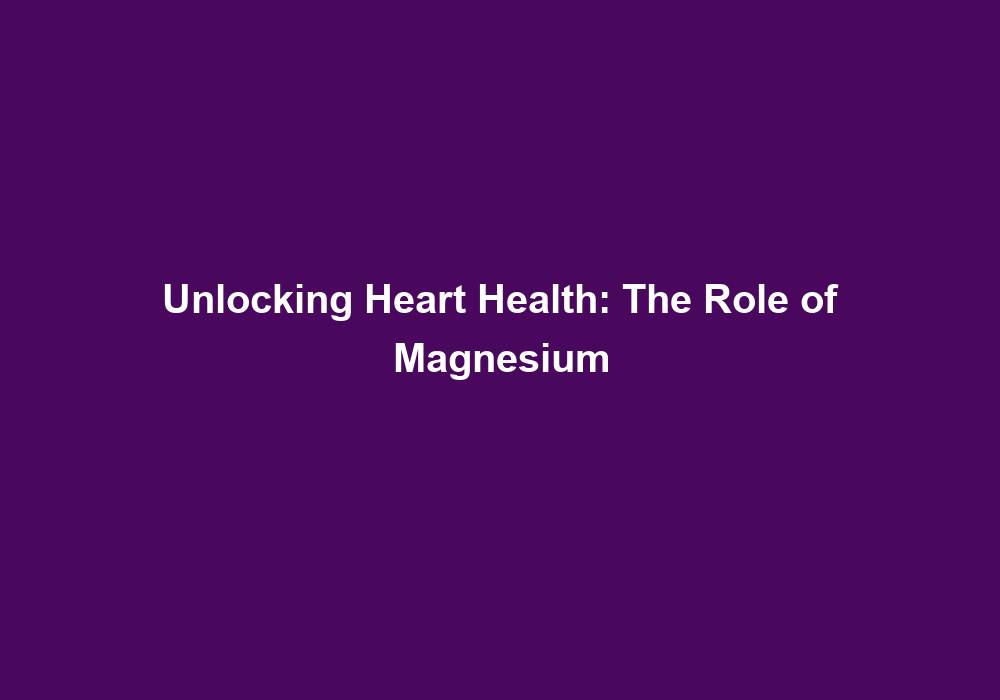Unlocking Heart Health: The Role of Magnesium
The heart is an extraordinary organ that plays a vital role in our overall health and well-being. It tirelessly pumps blood throughout our bodies, delivering oxygen and essential nutrients to every cell. Maintaining a healthy heart is crucial, and one mineral that plays a significant role in promoting heart health is magnesium. In this article, we will delve into the importance of magnesium in supporting heart health and explore how it can unlock the door to a healthier heart.
Understanding Magnesium
Magnesium is a mineral that is essential for numerous bodily functions, including nerve function, muscle contraction, and maintaining a steady heartbeat. It is involved in over 300 enzymatic reactions in the body, making it crucial for overall health. Magnesium is also known for its role in bone health, energy production, and DNA synthesis.
Magnesium is primarily found within cells, with about 60% of it located in the bones and teeth and the remaining 40% in the soft tissues and fluids. It works in conjunction with calcium to regulate muscle contractions, including the contraction and relaxation of the heart muscle. This balance between magnesium and calcium is crucial for maintaining a steady heartbeat and preventing arrhythmias.
The body obtains magnesium through dietary sources, such as whole foods and supplements. However, it’s important to note that certain factors can affect magnesium absorption, including high fiber intake, excessive alcohol consumption, and certain medications. Ensuring adequate magnesium intake is essential for optimal heart health.
The Link Between Magnesium and Heart Health
Magnesium plays a crucial role in maintaining heart health through various mechanisms. Here are some key ways in which magnesium contributes to a healthy heart:
1. Regulating Blood Pressure
High blood pressure, or hypertension, is a significant risk factor for heart disease. Studies have shown that magnesium supplementation can help lower blood pressure levels, especially in individuals with hypertension. Magnesium helps relax and dilate blood vessels, allowing blood to flow more smoothly and reducing the strain on the heart.
In addition to its vasodilatory effects, magnesium also helps regulate the balance of other minerals, such as sodium and potassium, which are essential for maintaining proper blood pressure levels. By promoting the excretion of excess sodium and facilitating the uptake of potassium, magnesium helps maintain a healthy sodium-potassium balance, which is crucial for blood pressure regulation.
2. Maintaining a Steady Heartbeat
Magnesium is essential for maintaining a regular heartbeat. It helps regulate the electrical impulses that control the rhythm of the heart. Low levels of magnesium can lead to arrhythmias, abnormal heart rhythms that can be potentially life-threatening. Ensuring an adequate intake of magnesium can help promote a normal, healthy heartbeat.
One of the ways magnesium helps maintain a steady heartbeat is by modulating the activity of calcium channels in the heart cells. Calcium influx into the cells triggers muscle contraction, including the contraction of the heart muscle. Magnesium acts as a natural calcium channel blocker, preventing excessive calcium entry into the cells and helping to maintain a balanced and coordinated heartbeat.
3. Preventing Atherosclerosis
Atherosclerosis is a condition characterized by the buildup of plaque in the arteries, narrowing the blood vessels and restricting blood flow. This can lead to various cardiovascular problems, including heart attacks and strokes. Magnesium has been found to play a protective role against atherosclerosis by reducing inflammation and preventing the formation of plaque.
Inflammation is a key driver of atherosclerosis, and magnesium has anti-inflammatory properties that can help reduce the inflammatory response within the arterial walls. Magnesium also helps regulate lipid metabolism, preventing the oxidation of low-density lipoprotein (LDL) cholesterol, which is a crucial step in the formation of plaque. By reducing inflammation and preventing plaque formation, magnesium contributes to maintaining clear and healthy arteries.
4. Reducing the Risk of Heart Disease
Numerous studies have linked low magnesium levels to an increased risk of heart disease. Ensuring an optimal magnesium intake can help lower this risk by improving cardiovascular health, reducing inflammation, and maintaining healthy blood pressure and cholesterol levels.
In addition to its direct effects on blood pressure regulation and atherosclerosis prevention, magnesium also helps maintain the balance of other essential nutrients involved in heart health. For example, magnesium works in synergy with potassium and calcium to support proper muscle function, including the heart muscle. It also helps regulate the metabolism of glucose and insulin, which are crucial for preventing diabetes, a significant risk factor for heart disease.
Food Sources of Magnesium
While magnesium supplements are available, it is generally recommended to obtain nutrients from whole foods whenever possible. Here are some excellent food sources of magnesium:
-
Leafy green vegetables: Spinach, kale, and Swiss chard are rich in magnesium. These vegetables not only provide magnesium but also offer other beneficial nutrients, such as antioxidants and fiber, which further support heart health.
-
Nuts and seeds: Almonds, cashews, and pumpkin seeds are great sources of magnesium. They are also rich in heart-healthy fats, fiber, and antioxidants, making them a nutritious addition to any diet.
-
Legumes: Beans, lentils, and chickpeas are not only rich in magnesium but also provide a good amount of fiber and other essential nutrients. They are also low in saturated fat and cholesterol, making them a heart-healthy choice.
-
Whole grains: Brown rice, quinoa, and oats are not only packed with magnesium but also offer other valuable nutrients like fiber and antioxidants. These whole grains provide sustained energy and promote satiety, helping to maintain a healthy weight and reduce the risk of heart disease.
-
Fish: Fatty fish, such as salmon and mackerel, are excellent sources of magnesium and heart-healthy omega-3 fatty acids. Omega-3 fatty acids have been shown to reduce inflammation, lower triglyceride levels, and improve overall heart health.
Magnesium Supplements
In some cases, dietary sources may not provide enough magnesium, especially for individuals with certain health conditions or deficiencies. In such instances, magnesium supplements can be considered under the guidance of a healthcare professional. It is important to note that excessive magnesium intake through supplements can lead to adverse effects, so it is essential to follow the recommended dosage.
When choosing a magnesium supplement, consider the form of magnesium used. Some common forms include magnesium citrate, magnesium oxide, and magnesium glycinate. Each form has different absorption rates and bioavailability, so it’s important to choose the most appropriate form based on individual needs and preferences.
Conclusion
Magnesium plays a vital role in promoting heart health. From regulating blood pressure and maintaining a steady heartbeat to preventing atherosclerosis and reducing the risk of heart disease, magnesium is truly a superstar mineral. By incorporating magnesium-rich foods into your diet and considering supplements when necessary, you can unlock the potential for a healthier heart. Remember, always consult with a healthcare professional before starting any new supplements or making significant changes to your diet.







